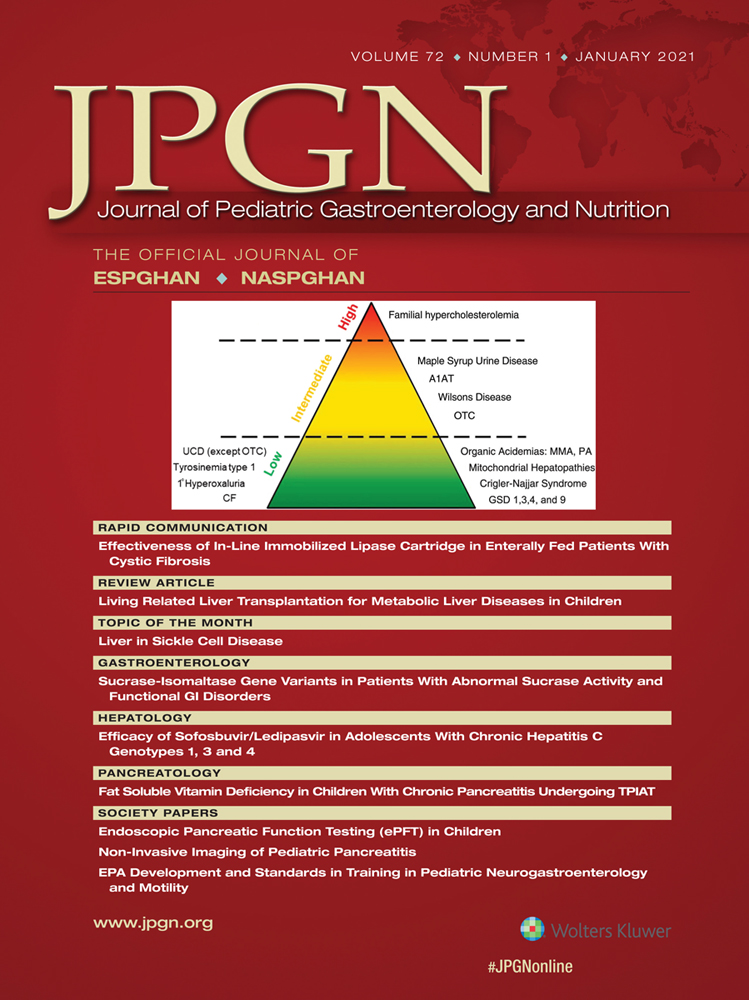Factors Associated With Nonadherence in an Emergency Department-based Multicenter Randomized Clinical Trial of a Probiotic in Children With Acute Gastroenteritis
Supplemental digital content is available for this article. Direct URL citations appear in the printed text, and links to the digital files are provided in the HTML text of this article on the journal's Web site (www.jpgn.org).
Information contained in this article is presented at the 2019 Pediatric Academic Societies Annual Meeting, Baltimore, MD, May 2019.
This work is supported by the Eunice Kennedy Shriver National Institute of Child Health and Human Development (R01HD071915). The Pediatric Emergency Care Applied Research Network is supported by the Health Resources and Services Administration, Maternal and Child Health Bureau, Emergency Medical Services for Children Program through the following cooperative agreements: U03MC00001, U03MC00003, U03MC00006, U03MC00007, U03MC00008, U03MC22684, and U03MC22685. S.B.F. is supported by the Alberta Children's Hospital Foundation Professorship in Child Health and Wellness. P.I.T. is supported by the Washington University Digestive Diseases Research Core Center (P30DK052574).
The Food and Drug Administration granted an Investigational New Drug approval (IND#12371). iHealth Inc. provided L rhamnosus GG and placebo capsules at no cost but had no involvement in the conduct or reporting of the trial.
D.S. received in-kind study drug and placebo from iHeath Inc.; however, the company did not contribute financially to the study or to the investigators, and their employees do not have access to study data. I-Health personnel had no role in study design, collection management, analysis and interpretation of data nor did they have any role or authority in writing the report nor decision to submit the trial for publication.
S.B.F. has received in-kind (study drug and placebo) from Institut Lallemand Inc, Novartis and GlaxoSmithKline. He provides consulting services to Takeda Pharmaceutical Company, RedHill Biopharma Ltd and Eligo Bioscience S.A.S. on childhood intestinal disorders and is supported by the Alberta Children's Hospital Foundation Professorship in Child Health and Wellness. P.I.T. is a consultant to, a holder of equity in, and a member of the Scientific Advisory Board of MediBeacon Inc, which is developing technology to test intestinal permeability in people, and is a co-inventor on a patent that might generate royalties on this technology in the future. He is also a consultant to Takeda Pharmaceuticals on childhood intestinal disorders. All other authors report no conflicts of interest.
Trial Registration: Clinicaltrials.gov # NCT01773967 https://clinicaltrials.gov/ct2/show/NCT01773967.
ABSTRACT
Nonadherence in clinical trials affects safety and efficacy determinations. Predictors of nonadherence in pediatric acute illness trials are unknown. We sought to examine predictors of nonadherence in a multicenter randomized trial of 971 children with acute gastroenteritis receiving a 5-day oral course of Lactobacillus rhamnosus GG or placebo. Adherence, defined as consuming all doses of the product, was reported by the parents and recorded during daily follow-up contacts. Of 943 patients with follow-up data, 766 (81.2%) were adherent. On multivariate analysis, older age (OR 1.19; 95% CI: 1.00–1.43), increased vomiting duration (OR 1.23; 95% CI: 1.05–1.45), higher dehydration score (OR 1.23, 95% CI: 1.07–1.42), and hospitalization following ED discharge (OR 4.16, 95% CI: 1.21--14.30) were factors associated with nonadherence; however, those with highest severity scores were more likely to adhere (OR 0.87, 95% CI: 0.80–0.95). These data may inform strategies and specific targets to maximize adherence in future pediatric trials.




